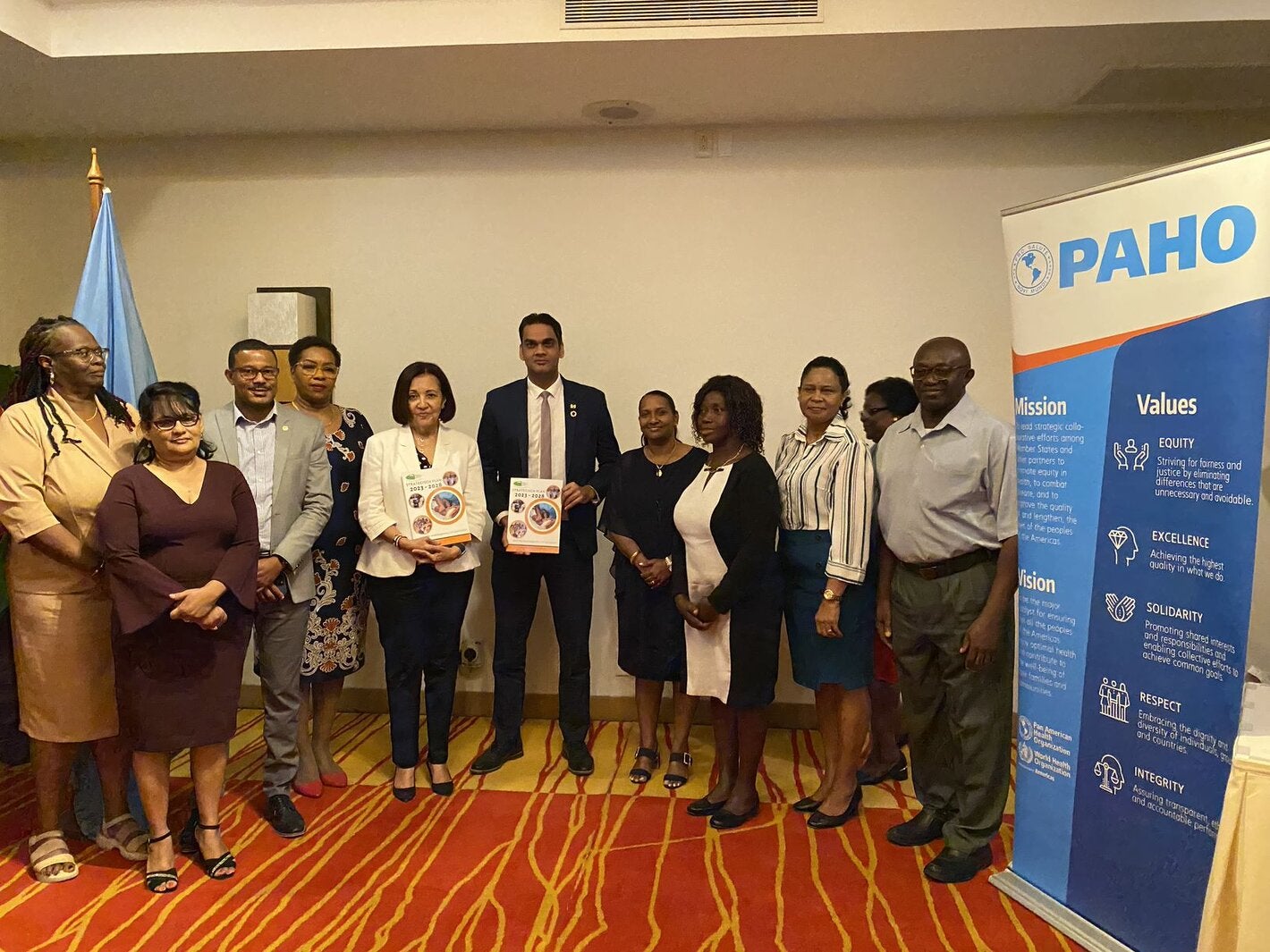
Group picture of the launch of the Strategic Plan for Nursing 2023-2028 in Suriname
Suriname, April 04, 2023 (PAHO) – In 2019, the Nursing Policy Body Suriname (RaVeSu) was established by the Ministry of Health in Suriname with a primary objective to develop, implement, and monitor the first-ever Strategic Plan for Nursing in Suriname. In addition to this task, RaVeSu is tasked with advising the Director of Health in the Ministry of Health regarding various aspects of the nursing profession, including the implementation of key positions, the development of standards for nursing practice and education, the development and implementation of a human resource strategy, and laws and regulations for the nursing sector.
To support the RaVeSu in its tasks, the Pan American Health Organization/World Health Organization (PAHO/WHO) has collaborated to assist the RaVeSu with the development of the first-ever Strategic Plan for Nursing for the period of 2023-2028. This plan will strengthen the delivery of nursing services in Suriname, optimize the contribution of nurses toward achieving universal health coverage, and strengthen the overall human resources for health capacity.
The formal handover of this plan was done during a one-day Strategic Planning event/workshop to strengthen nursing services in Suriname hosted for various stakeholders, including the Ministry of Health Suriname, Bureau of Public Health Suriname, PAHO/WHO Suriname Country Office, RaVeSu, and other relevant stakeholders.
The primary objective of this day was to formally present the completed Strategic Plan to the Ministry of Health. In addition to this, the workshop section aimed to discuss the key strategies outlined in the plan and how they would be implemented to strengthen the nursing sector in Suriname.
The day began with remarks from Carol de Baas, Chair of the Nursing Policy Body (RaVeSu), who emphasized the crucial role of nursing services in Suriname's healthcare system. She highlighted the need to develop a comprehensive strategy to strengthen nursing services in the country.
PAHO/WHO Representative Suriname Dr. Reneau-Vernon, who had previously worked alongside nurses for many years in Belize, expressed her excitement to attend this nursing workshop and praised the leadership and dedication of nurses. She advised participants to continue promoting, strengthening, and maintaining the nursing sector in Suriname, emphasizing the important role that nurses play in achieving health objectives at both national and international levels.
Minister of Health, Dr. Ramadhin, emphasized the crucial role of nursing services in Suriname's healthcare system. He expressed his gratitude to RaVeSu and PAHO/WHO for organizing the workshop and providing technical support for the development of the strategic plan.
The Minister highlighted the significance of having a formulated strategy for the nursing sector, which constitutes the largest group of human resources in the healthcare sector. He stressed that this strategic plan would help rationalize the healthcare sector in Suriname by providing a policy and strategy framework for health organizations.
Following these remarks, Faucia Niamut presented on the current state of nursing in Suriname, outlining the challenges faced by the sector and the need for recommendations in the new strategic plan to address these issues.
Angele Wallerlei-Kumbangsila, then presented the key strategies contained within the new plan and, shed light on the vital role of the nursing sector in achieving international and national objectives on communicable diseases (CD) and non-communicable diseases (NCDs). The strategic plan aims to strengthen the nursing workforce, improve the quality of nursing care, and increase access to nursing services, all of which are crucial components in achieving these objectives. Without a comprehensive plan in place, the nursing sector may not be able to meet the growing healthcare demands of Suriname's population and effectively contribute to achieving CD and NCD goals.
A virtual presentation was made by the PAHO/WDC, outlining the Global Strategy for Nursing. The presentation was given by a representative from PAHO/WHO, who spoke about the importance of nursing in global healthcare and the need for a strong nursing workforce in every country. The presentation emphasized the critical role of nurses in achieving universal health coverage and the need for investment in nursing education and training. The Global Strategy for Nursing also highlighted the need for policy changes to support the nursing workforce and the importance of engaging nurses in the decision-making process.
The day concluded with the official handover of the strategic plan to the Minister of Health. The plan is expected to play a vital role in the development of nursing services in Suriname, helping to ensure that nurses are equipped with the skills and resources they need to provide high-quality care to patients across the country.
After the official handover of the strategic plan, the RaVeSu conducted a strategic planning session. Ruth Mangroe and Suze Holband led the session which aimed to identify and prioritize key areas for action to strengthen nursing services in Suriname. The session involved a group discussion, with the goal of developing specific and achievable goals for RaVeSu to work towards. By the end of the session, the participants had identified several priority areas, including improving working conditions and increasing access to professional development opportunities for nurses. The RaVeSu leadership expressed gratitude for the valuable contributions of all participants and reaffirmed their commitment to working towards a stronger nursing workforce in Suriname.
Overall, the strategic planning workshop provided a valuable platform for stakeholders in Suriname's healthcare sector to come together and discuss ways to improve nursing services in the country. The presentations and discussions held during the workshop highlighted the important role of nursing in achieving universal health coverage and the need for continued investment and support for the nursing workforce.




